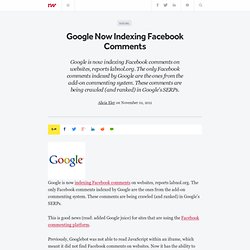

Microsoft idea: Search the Internet like a celebrity. How would Megan Fox search?

Microsoft is seeking a patent on the concept of applying a “persona” to Internet search results — allowing people to see results shaped by the personalities and preferences of their friends or even Hollywood celebrities. The patent application cites the example of conducting a search under the persona of such celebrities as Miley Cyrus, Taylor Swift, Megan Fox, or Jessica Lange — returning dresses that reflect their “style and/or fashion preferences,” including “color, fit, designer, cut, etc.” As with most of these things, there’s no indication that Microsoft actually plans to implement this approach in its core Bing search engine.
But it provides a sense for the types of things the company’s search specialists are thinking about in the quest to catch up to Google. 30 Specialist (and Super Smart) Search Engines. Google is widely (and rightly) recognised as the mother of all search engines.

But, if you need to drill down your searches by more specific details, do you trust Google to give you what you need every single time? Here’s a collection of 3o vertical search engines which you should have up your sleeve when you need some specialist power. Flights / Travel 1. SkyScanner.net – The leading flights search engine, providing information about all carriers to help you find the best deal. 2. 3. 4. 5. Images 7. 8. People. Microsoft idea: Analyze Facebook posts to deduce mood, interests, education. Thanks to its Facebook partnership, Microsoft has been strongly positioned to use social media to enhance its Bing search engine, incorporating the preferences of a person’s friends into the search results that person sees.

But this would take it to a whole new level. A newly surfaced Microsoft patent application describes a “user-following engine” that would analyze a user’s posts on Facebook, Twitter and other social media sites to deduce mood, interests, and possibly even the person’s education level and comprehension of specific topics. Then the system would automatically adjust the search experience and results to better match those characteristics. In the case of the person’s mood, for example, the background of the search interface could be changed to a different color. Or if the person has been posting to Facebook about an upcoming trip, the search engine can use that to make the search engine And then there’s the part about the person’s smarts. How American Express Grows Its Massive Social Media Presence.
The Social Brands Series is supported by Spredfast, a social media management platform provider helping organizations unlock social business potential.

Discover best practices & proven tactics for using social in the enterprise with the 7 Whiteboard Sessions for every Social Strategist. Credit card company American Express seemed to come out of nowhere in the past year, offering one social media program after another. Facebook, Twitter, Foursquare, YouTube, LinkedIn, Google+ — it's got them all covered, and even better, it stands for what its consumers want across all of the social platforms it's on. While American Express has seemed to pump a lot of life into its social strategy as of late, it has actually been on the scene since 2009, helping cardholders solve problems one tweet and wall post at a time.
Yandex adds Twitter deal to power real-time search. Google Now Indexing Facebook Comments. Google is now indexing Facebook comments on websites, reports labnol.org.

The only Facebook comments indexed by Google are the ones from the add-on commenting system. These comments are being crawled (and ranked) in Google's SERPs. This is good news (read: added Google juice) for sites that are using the Facebook commenting platform. Previously, Googlebot was not able to read JavaScript within an iframe, which meant it did not find Facebook comments on websites. Now it has the ability to index some dynamic comments, but not all. Here's how Facebook commenting will look in Google Search, courtesy of SearchEngineLand. Now that Google indexes Facebook comments, websites have more incentive to install the add-on. Update: The IBTimes reported that Disqus comments are also searchable, yet when we performed a search they did not come up. 4 Steps to Create a Social Listening Strategy. Is your business thinking about social analytics? The first step when considering social analytics is to establish a listening strategy. In social media, listening acts as a guide through the ever-changing and interesting world of the blogosphere.
Why? Because listening is an ongoing process that is necessary to keep a strategy fresh and competitive. It enables decision-makers to find and better understand opportunities and stakeholders. So, exactly how do you go about listening? #1: Determine your target audience Once an organization has determined whom to target, it’s critical to understand where to engage them online. For example, according to Anderson Analytics, Generation Z (13- to 14-year-old) social network users were more likely to use MySpace than Facebook; only 9% used Twitter and none were active on LinkedIn. An example of an organization successfully targeting and engaging an audience is Seton Hall University.